Observe and photograph a species in its natural habitat
Learn where and when to observe a species in the wild, how to recognize it in the field, and what habitats it lives in. Get photography tips adapted to its behavior and capture stunning images without disturbing the animal. For full details, open the complete profile in the WildlifePhotographer app.
Crested Porcupine
Scientific name: Hystrix cristata

IUCN Status: Least Concern
Family: HYSTRICIDAE
Group: Mammals
Shyness: Suspicious
Safe distance: 30 m
Breeding season / Courtship: 15.10-15.12
Gestation: 7 mois
Births: 15.05-15.07
Habitat:
Rocky regions and wooded savannas
Description:
The Crestless Porcupine is a large nocturnal mammal primarily found in sub-Saharan Africa, in tropical forests and savannas. It measures between 60 and 80 cm in length, with a tail of 20 to 30 cm, and weighs between 15 and 30 kg. Its fur is primarily made up of rigid, long, sharp quills covering its back, sides, and tail. At the tip of its tail, it has modified quills that produce a distinctive sound when shaken, warning predators of its presence. The Crestless Porcupine is herbivorous and primarily feeds on roots, bark, fruits, and leaves. While its population remains relatively stable, it can be threatened by habitat destruction and hunting.
Recommended lens:
>=400 mm
Photography tips:
Approach slowly and cautiously, as porcupines can be nervous and defend themselves by projecting their quills when they feel threatened.
Photograph from a distance to avoid disturbing the animal and use a telephoto lens to capture details without getting too close.
Be patient: The porcupine is often active at night, so be prepared to photograph at dusk or during nighttime with settings adapted for low light.
Respect its space: Do not attempt to handle or disturb it when it feels safe in its natural habitat.
The Crested Porcupine is a species of minor concern, but it is important to respect its space and natural behavior. Be sure not to disturb its nocturnal activities or habitat. Follow local conservation rules to minimize the impact of your presence.
Ready to take action?
Choose your platform and start your free trial today



